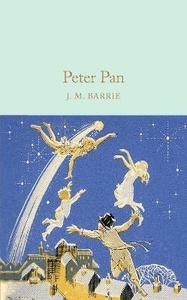Peter Pan

Editorial Pan
Colección Macmillan's Collector's Library, Número 0
Fecha de edición julio 2016 · Edición nº 1
Idioma inglés
EAN 9781909621633
200 páginas
Libro
encuadernado en tapa dura
Dimensiones 105 mm x 155 mm
Resumen del libro
J. M. Barrie's Peter Pan is a thrilling adventure for all ages - the story of the boy who refuses to grow up is a tale that never gets old.
It follows the Darling children, Wendy, John and Michael, who befriend the magical Peter and are whisked away to Neverland, where the villainous Captain Hook and the brave Lost Boys await. With illustrations by F. D.
Bedford, gorgeously coloured by one of Britain's leading colourists, Barbara Frith, this majestic Macmillan Collector's Library edition brings to life one of the world's favourite tales. Designed to appeal to the booklover, the Macmillan Collector's Library is a series of beautiful gift editions of much loved classic titles. Macmillan Collector's Library are books to love and treasure.
Biografía del autor
A James Matthew Barrie lo conocemos por su personaje Peter Pan. Seguramente, Peter Pan jamás hubiese existido de no ser por unos niños que el autor conoció en los jardines de Kensington en Londres: los hijos de Sylvia Llewellyn Davies. Tío Jim , como lo llamaban estos niños, acompañaba a la familia en las vacaciones, e inventaba historias y juegos que sirvieron de inspiración para sus relatos y obras de teatro. Cuando murieron los padres de los chicos, Barrie los siguió ayudando hasta que, no como Peter Pan, se convirtieron en adultos. Apasionado del críquet, creó un equipo de aficionados con sus amigos, los escritores Arthur Conan Doyle, Rudyard Kipling, G. K. Chesterton y Jerome K. Jerome.








